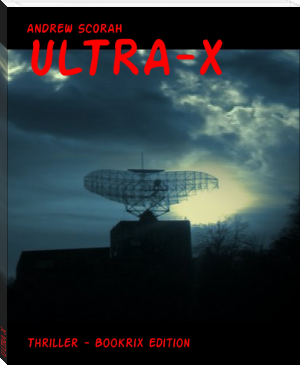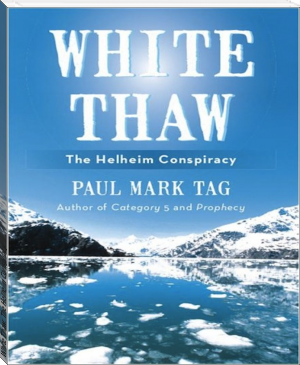The Omega Sanction by Andrew Scorah (urban books to read TXT) 📖

- Author: Andrew Scorah
Book online «The Omega Sanction by Andrew Scorah (urban books to read TXT) 📖». Author Andrew Scorah
Jennifer and the professor lay nearby, and appeared to be unconscious. Trotsky was by the door leading out of the room.
He sat up, and looked at Bane.
“Well that was fucked up,” he said, rubbing at his own eyes.
Unsteadily, Bane gained his feet. He retrieved his weapon before stepping over to Jennifer. She was starting to come round.
“Where are we?” She asked, her voice groggy from the transition.
“I’m not sure, Hitlers bunker under the Reich Chansellory, I think.”
“So it worked then? We’re alive, amazing.”
Bane helped her to stand, before checking on the professor. He was coming round, he sat up and shook his head.
“I’m okay, I’m okay,” he refused Banes hand, and climbed to his feet unaided.
“Trot, check outside the door.”
Trotsky nodded, and turned to the door, opening it enough to peer through. He closed it again, and turned to face Bane.
“No ones out there, all I could see was a few small tables, and chairs, papers scattered over the floor.”
Bane nodded. Chewing his thumbnail, he thought for a minute.
“Okay boss, what’s the plan?” Trotsky asked.
He turned to face them all.
“Our mission, as I see it still stands,” he began, “But I shit you not, we have stepped into hell.”
He pointed to the roof above them.
“We are stuck in the middle of 90,000 German defenders, and more than a million of Zukhov's and Konev's Red Army troops. We’re outsiders, so either side would gladly shoot us down. Not to mention the constant artillery barrage Berlin is suffering. But, if we keep our heads together, we can do this, we have to, for the sake of our future. If Koenig succeeds, then what is happening here today, and over the last few years will seem like a small disagreement.”
“Not bad odds at all,” Trotsky said, pokerfaced.
“How much ammo have you got left?”
Trotsky checked through his gear.
“Four clips for my Glock, and six for the MP 5, plus four frag grenades.”
Bane discovered he had six magazines for his Beretta, and nine for his assault rifle, and six fragmentation grenades, plus four flashbangs.
"Not enough to do what we have to, but its enough for now, the upside is, bullets for the MP 5 won’t be hard to find, the Germans MP 38 and MP 40, otherwise known as the Schmeisser, fires the same bullets.”
“So, Bane do you have any plan at all?” Jennifer asked.
Turning to her he answered, “We follow Koenig, if we can, he will lead us to the bell here, we make him tell us where this ultimate weapon is, go home and destroy it.”
“I know where he’ll be going.”
They all turned to look at the professor.
“He’s heading for the Jonas Valley Industrial Complex in Poland, that’s where Kammler left 1945 from.”
“Of course,” Bane said, “I read that in the CIA files. Lets get out of here.”
He headed for the door.
“Wait, we’re all forgetting something,” Trotsky said.
He looked at their blank faces.
“What about the grandfather complex?”
Professor Guyler slapped a hand on his shoulder.
“My dear boy, we have enough problems without thinking about something so complex, and anyway the Novikov self-consistency principle expresses a different view on how backwards time travel could be possible without a danger of paradoxes. According to this hypothesis, the only possible time lines are those entirely self-consistent—so anything a time traveller does in the past must have been part of history all along, and the time traveller can never do anything to prevent the trip back in time from happening, since this would represent an inconsistency. Nicholas J. J. Smith argues, for example, that if some time traveller killed the child who lived in his old address, this would ipso facto necessitate that the child was not the time traveller's younger self, nor the younger self of anyone alive in the time frame that the time traveller came from. This could be extrapolated further into the possibility that the child's death led to the family moving away, which in turn led to the time traveller's family moving into the house guaranteeing that the house later became the home the time traveller would then grow up in, forming a predestination paradox.”
Trotsky looked at the professor, a blank expression on his face.
“I knew that, I think.”
Bane sighed, shaking his head.
“If you’ve finished with the lesson, professor?”
“Oh, sorry, I tend to get carried away.”
Bane cracked open the door, and after checking it was still clear, he slipped out. The others followed behind him.
They found themselves in a long room, only slightly wider than a corridor. Furnished with tables and chairs. An old couch sat against the opposite battleship grey wall next to a door that from the sign on it led to the toilets. Everything was tainted with a fine layer of dust.
Three other doors led out of the room. The air was redolent with sweat and febrile exhaustion, terrible foreboding and despair.
They made their way to the door at the far end of the room. Bane put his ear to the door, listening for any sound from beyond. All seemed quiet.
“I don’t get this,” Trotsky said, “There was supposed to be a fair few people down here.”
“Koenig’s changed that I think,” Bane replied.
Bane grabbed the doors handle, and cracked it open an inch. Peering through, he saw another long low ceilinged room, illuminated by a bare bulb. Appearing to be some kind of conference room with a long table piled high with files and maps. He saw a man in an SS uniform having a heated conversation on a telephone at the far end of the room. He had his back to Bane. He also appeared unarmed.
Bane pulled open the door. With his weapon aimed at the man, he silently moved towards him. The others followed behind.
Bane jammed the muzzle of his gun into the mans neck. He froze, and slowly replaced the handset.
“Sprechen Sie Englisch?”
“I do, a little.”
“What’s your name?”
“I’m SS Untersturmführer Franz Schädle.”
The name was one that Bane was familiar with, he was the commander of Adolf Hitler's personal bodyguard, the SS-Begleitkommando des Führers, and one of the men who opted for suicide down in the Fuhrer Bunker, rather than surrender. The situation he found himself in was surreal indeed. Here he was face to face with history. And now it was living, moving, and breathing.
“Okay, Franz, slowly turn around, no sudden moves.”
Bane moved back a few paces, as the Untersturmführer turned to face them. His eyes widened at the sight before him.
“Who are you? Americans, Russians?”
“That does not matter, where are the men who came before us?”
“They left, twenty minutes ago, with the Fuhrer, and his private secretary, Herr Borman.”
So, Koenig had already changed history. Or had he, as the professor had pointed out in his earlier lengthy diatribe, anything a time traveller does in the past must have been part of history all along. He hoped this was true. The last thing Bane wanted, if they managed to return to their own time, was a massive change, a world he did not recognise.
“Where have they gone to?” He asked.
“There’s a converted Junkers waiting in the Tiergarten, they are going to Jonas Valley in Poland.”
Bane knew he was referring to the large inner city park close to the Reichstag, although most of the trees would be gone, it was a perfect place to set down a plane.
“You do know the war is lost now?” Trotsky asked.
He looked over Banes shoulder.
“Yes!”
He glared at Trotsky, his eyes filled with hate.
“We’ve known for a while we are going to lose, I don’t need reminding by a filthy Juden,” Schädle almost spat the last word.
Bane was filled with revulsion, in that last word was all the horror and hatred perpetrated by the Third Reich. And also the arrogance of a race believing they were above all other races on the planet.
Without thinking, Bane’s finger twitched on the trigger of his gun. The SS man was hit in the face, and knocked over onto the table. Blood from the exit wound sprayed the wall behind him.
A door to his left swung open, and a man armed with a Luger stepped out. Bane swivelled. The man raised his weapon, but Bane was quicker. His bullet caught the man in the chin, taking away half his face and propelling him back through the door.
Bane knew in this time and place it was kill or be killed, like it or not they were in a war zone. Even though his first kill had been a knee jerk reaction, he knew he could not leave the man alive. Questions of morality had to be dispensed with.
“That’s how you do it, you have no time for thought here, it’s kill or be killed,” Bane told them all.
He looked at Trotsky who nodded.
“Right, lets see if we can get to this plane, maybe we can persuade them to take us with them.”
Without a backward glance he headed for the door at the end of the room. A long time ago, Bane had seen the floor plans for the bunker. He knew the door would take them up into the small garden to the rear of the Reich Chancellery. From there, a brisk walk while evading the bullets of the ring of steel surrounding the Chancellery, would take them to the park, and that would be the easy part.
CHAPTER ELEVEN
Chapter 26
Barry Goldwater was having trouble processing what he had observed on the screen. One minute he was viewing Area 51 from the camera positioned high above in the Jumbled Hills. Next there was a bright flash and the feed died.
He took the phone from his desk, and dialled out to Captain Jefferson who was in charge of the ring of steel placed around the base.
“What the fuck just happened? ” He said when Jefferson answered.
“I don’t know sir,” came the reply, “some kind of explosion, I can see a massive mushroom cloud rising above the mountains, and the ground shook like we had an earthquake.”
Before Goldwater could say another word, he heard a roaring sound then the line went dead.
Kammler spoke for over an hour and a half. Both were aware of the fact that if what he told them were true, then indeed the whole world was in dire straights. Die glocke was an experiment, carried out by Third Reich scientists working for the SS in a German facility known as Der Riese, “The Giant”, near the Wenceslaus mine and close to the Czech border. Under orders from the Fuhrer they were tasked to build the ultimate weapon, one so devastating the allies would have no choice but to surrender to the might of the Reich. The Bell was a metallic object, approximately 9 ft. in diameter and 12-15 ft. Tall. It was comprised of two counter-rotating cylinders, rotating a purplish liquid-metallic looking substance code-named "Xerum 525" by the Germans. At high speeds. "Xerum 525" was apparently highly radioactive, being purple in colour, and housed in cylinders with lead lining 3cm (12 in.) thick. During use, it could only be run for approximately one to two minutes, as it apparently gave off strong radiation and or other electromagnetic or unknown field effects. Several scientists died on its first operation. Subsequent tests included various plants and animals. All of which decomposed into a blackish goo and without normal putrefaction, within a matter of a few minutes or hours after exposure to its field effects when in operation. Technicians near the Bell during these experiments reported metallic tastes in their mouths after being exposed to it. The chamber in which the Bell was tested was lined with ceramic bricks and rubber mats, and had to have its rubber matting removed and burned after each test, and it was subsequently washed down with brine by inmates from nearby concentration camps.
The time travel properties were an
 Reading books romantic stories you will plunge into the world of feelings and love. Most of the time the story ends happily. Very interesting and informative to read books historical romance novels to feel the atmosphere of that time.
Reading books romantic stories you will plunge into the world of feelings and love. Most of the time the story ends happily. Very interesting and informative to read books historical romance novels to feel the atmosphere of that time.




Comments (0)